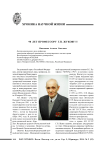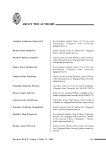Статьи журнала - Legal Concept
Все статьи: 1499
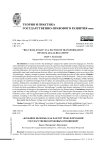
"Большие вызовы" как фактор трансформации государственно-правовых отношений
Статья научная
Введение: последние годы отмечены стремительным вторжением в языковой оборот категории «большие вызовы». Из словосочетания прогностическо-публицистического плана выражение проникло в нормативные правовые акты, став юридической категорией, потенциально способной изменить социальные отношения. Однако в правовых актах и достаточно небольшом каталоге юридических научных публикаций данный конструкт рассматривается через призму социально-экономических отношений, не выделяются его правовая суть и возможные государственно-правовые преобразования, которые могут за ним воспоследовать. Цель: дать обзорную характеристику категории «большие вызовы» сквозь ее генезис, преобразование и через призму правовых реалий. Методы: методологическую основу исследования составили общенаучные методы - анализ и синтез, а также частнонаучные - формально-юридический и сравнительно-правовой. Результаты: «большие вызовы», изначально относясь к категории научного знания IT-сферы, впоследствии используются применительно к широким группам общественных отношений, находя свое закрепление в программных документах международного и национального характера. На внутригосударственном уровне акты являются не только декларацией намерений, но и обязательным планом работы для публичных органов управления. В России окончательное закрепление в публично-правовой риторике термина «большие вызовы» произошло в 2016 г., что привело к внесению изменений или появлению новых правовых актов планового характера. Выводы: несмотря на легальное определение «больших вызовов» в Стратегии научно-технологического развития Российской Федерации, по-прежнему отсутствует правовая характеристика рассматриваемой институции, несмотря на то что она несет в себе колоссальный правопреобразующий потенциал, в том числе и в сфере публичного управления, закладывая основы для такого перспективного способа воздействия на социальные отношения, как «smart regulation». Предпринята попытка дать дефиницию «больших вызовов» в правовом дискурсе.
Бесплатно
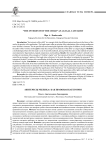
"Интересы ребенка" как правовая категория
Статья научная
«Интересы ребенка» - понятие, которое имеет различное наполнение и звучание в теории права и практике его применения. Специалистами в области права высказываются мнения о замене существующего неопределенного термина «интересы детей» на конкретную и более содержательную норму о правах детей, в связи с чем автором в работе поставлена цель исследования понятия «интересы ребенка» как правовой категории. Методы: методологическую основу данного исследования составляет совокупность методов научного познания, среди которых основное место занимают методы системного и сравнительно-правового анализа, логического сравнения и сопоставления. Результаты: обоснованное в работе авторское отношение к проблеме соотношения понятий «права ребенка» и «интересы ребенка» опирается на мнение компетентной научной среды в вопросах правового статуса несовершеннолетних. Проводится исследование понятия «интересы ребенка» на предмет его закрепления в российских и международных документах в области защиты прав детей. Выводы: в результате исследования выявлены сущность и особенности интересов ребенка. Установлено, что «интерес» как правовая категория представляет ядро правового регулирования, определяет его направление, имеющее вполне определенные цели, ради достижения которых существует та или иная правовая норма. Указана значимость Федерального закона «Об основных гарантиях прав ребенка в Российской Федерации» как документа, устанавливающего основные гарантии прав и законных интересов детей, в целях создания правовых, социально-экономических условий для их реализации.
Бесплатно
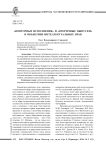
"Повторные исполнения" и "вторичные выпуски" в объективе интеллектуальных прав
Статья научная
Объектом публикации является система правоотношений в области индустрии музыкальной звукозаписи. Предмет публикации - анализ повторных исполнений ранее написанных музыкальных композиций, вторичных и бутлегерских выпусков аудионосителей с музыкальным контентом с точки зрения права интеллектуальной собственности. Изложенный материал базируется на общеметодологических подходах к анализу социальных явлений, где приоритетами выступают описательный метод и классификационный подход, диалектико-системный, сравнительный и структурно-функциональный анализ. Новизна проведенного исследования заключается также в том, что исследовательский материал иллюстрируется примерами с выведением юридической составляющей в соблюдении интеллектуальных прав.
Бесплатно
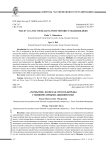
"Размытие" Доли как способ борьбы с миноритарными акционерами
Статья научная
Введение: вопрос размытия доли миноритарного акционера актуален для современного российского корпоративного права. Об этом свидетельствует отсутствие фундаментальных исследований и складывающаяся судебная практика по данному вопросу. В работе дается оценка законопроекту, который обеспечивает защиту долей миноритарных акционеров от «размытия», цель исследования - определить, какие способы являются часто встречающимися на практике, а также предложить пути решения проблемы размытия доли акционеров (участников) хозяйственных обществ. Методы: методологическую основу данного исследования составляет совокупность методов научного познания, среди которых основное место занимают методы, анализа и сравнительно-правовой. Результаты: работа представляет собой обоснованную позицию авторов, подкрепленную конкретными смоделированными ситуациями, которые раскрывают всю сущностную составляющую механизма размытия доли акционера в хозяйственном обществе. Раскрываются такие вопросы, как: понятие размытия доли, специфика этого явления и отличительные черты. Выводы: в результате исследования определены варианты действий мажоритарных (крупных) акционеров по отношению к миноритарным акционерам по вопросу размытия доли и ущемлению прав миноритариев в сфере корпоративного управления.
Бесплатно
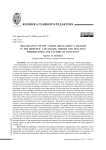
Статья научная
Главная тема очередного номера журнала «Legal Concept = Правовая парадигма» - «“Умное регулирование” как межотраслевая категория современного права» выбрана редакционной коллегией не случайно. Данная аннотация представляет собой обоснование сделанного выбора. Значимым аргументационным фактором автор считает объективную необходимость популяризации в российском правовом пространстве межотраслевой категории «умное ргулирование», которая уже давно занимает важное место в зарубежной правотворческой теории и практике и лишь с недавних пор стала привлекать внимание отечественных исследователей. Анонсируется проект ученых кафедры конституционного и муниципального права Волгоградского государственного университета, поддержанный Российским научным фондом в 2021 г. и направленный на комплексную разработку системы средств умного регулирования, исследование их юридической природы, взаимосвязи и соотношения с классическими категориями юриспруденции, обоснование критериев оценки их эффективности и особенностей применения в отраслях частного и публичного права. Отмечается, что понятие умное регулирование не обладает абсолютной новизной. С одной стороны, оно вполне органично, по мнению автора, вырастает из идей, давно и подробно разработанных в мировом политико-правовом учении. С другой стороны, комплекс средств, используемых в рамках умного регулирования, включает в себя, наряду с новыми, всю систему классических правовых инструментов. Некоторые из них приобретают иное звучание в условиях информационно-технологического развития, в том числе цифровизации, для других конкретизируются пределы и способы их применения. Представленные в главной теме номера и в остальных его рубриках статьи иллюстрируют многочисленные варианты использования современных и классических средств правового регулирования в различных сферах общественных отношений с учетом новых технологических и информационных возможностей. Отмечается, что термин умное регулирование с учетом больших вызовов современных реалий зачастую трансформируется в термин умные технологии правового регулирования и также применяется в различных сочетаниях с понятиями разной отраслевой и дисциплинарной принадлежности. Обосновывается нецелесообразность употребления термина умные технологии по отношению к правовому регулированию в таком узком смысле, ограничивая его контекстом тотальной информатизации общества и технологического развития. Утверждается, что речь должна идти о совокупности буквально всех современных правовых технологий. Рекомендуется трактовать «технологии» в широком смысле в качестве некой методы человеческой деятельности. А умными эти методы, по мнению автора, делает тот факт, что они выбираются, создаются и предлагаются представителями правотворческой теории и практики как обусловленные состоянием современного научного знания и общества. Рекомендуется также учитывать наличие подчиненности предлагаемых правовых методов и средств ценностным доминантам, характерным для современной культуры, а также их способность выступать организующим ядром той или иной сферы правового регулирования общественной жизнедеятельности.
Бесплатно
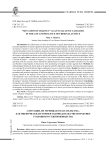
Статья научная
Введение: эффективность деятельности по расследованию преступлений во многом определяется способностью уголовно-процессуального законодательства четко регламентировать порядок уголовного судопроизводства. Однако законодатель по ряду причин вынужден прибегать к использованию такого приема юридической техники, как включение в текст уголовно-процессуальных норм оценочных категорий и терминов, неопределенность которых вынуждает правоприменителя интерпретировать их содержание по собственному усмотрению, исходя из уровня своего правосознания. В целом ряде случаев это приводит к необоснованному ограничению прав и свобод участников уголовного судопроизводства. В связи с этим в статье была поставлена цель проанализировать сущность одного из таких оценочных понятий, использованного в ст. 165 УПК РФ, - «ситуация, не терпящая отлагательства», изучить ошибки, допускаемые правоприменительной практикой при оперировании данным понятием, и определить возможности для недопущения необоснованных ограничений прав и свобод участников процесса при проведении в их отношении следственных действий. Методологическую основу работы составляют общенаучные (диалектический, системный, структурно-функциональный, логический и др.) и частнонаучные (формально-юридический, сравнительно-правовой и др.) методы исследования. Результаты: изложенная в работе авторская позиция основана на обобщении накопленных в теории уголовного процесса знаний и практического опыта принятия решений о производстве следственных действий в ситуациях, не терпящих отлагательства. На основании анализа норм УПК РФ, теоретико-правовой позиции Конституционного суда РФ, разъяснений, данных в постановлении Пленума Верховного Суда РФ, и положений ведомственных нормативных актов автор определяет сущность категории «ситуация, не терпящая отлагательства» и делает рекомендации по совершенствованию правоприменительной деятельности. Выводы: законность и обоснованность производства следственных действий, требующих судебного решения, в ситуации, не терпящей отлагательства, предполагает наличие фактических оснований для производства следственного действия, а также обоснования наличия ситуации, не терпящей отлагательства в решении органа расследования, так как именно это позволяет ограничить субъективизм при принятии решения о проведении следственного действия в указанной ситуации.
Бесплатно
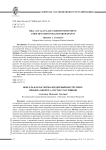
Bill as calculate-credit instrument: code of turnover and participants
Статья научная
Introduction. The modern market economy very widely uses the documentary calculate-credit instrument allowing the accrual of percentage on the borrowed amount, and this security is called an ordinary bill as opposed to a transfer bill. Intensive use of bills in the economic turnover led to the detailed regulation of the rules for their treatment. Purpose of the research is to reveal the rules and composition of the turnover of bill’s accounting. Methods. The author uses the combination of methods of scientific knowledge, including basic ones - the methods of historicism, systematic analysis and comparative legal method. Results. It is proved that the bill is an absolute, abstract and strictly formalized promise or offer to pay a sum of money. The difference between an ordinary bill and a transfer bill is that an ordinary bill draws unconditional promise of the payer, the bill drawer pays a sum of money, and the bill of transfer documents is addressed to another earlier unconditional bill drawer ’s offer of a cash payment. The lack of and / or incorrect execution of at least one of the props of the required information deprives the document of the bill’s force. In this case the obligations under the bill of all participants without exception arise due to the signature on the document. Conclusion. Bill, both individually and issued on the actual situation, non- equity securities, certifies and contains a property right to receive the said amount in it, such right may only be exercised upon presentation of the most valuable paper.
Бесплатно
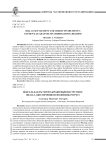
Bill as settlement and credit instruments: payment, guarantee of amortization, regress
Статья научная
The bill is a security, the amortization of the financial liability is against the only bill, that creditor exhibit to debtor. Exactly the creditor must apply with the original bill to the debtor to amortize the obligation, because it is impossible to reverse. The place of amortization the financial obligations of the bill is the domicile. Failure to present a bill for payment at all, implies the cessation of obligations only regress (spare) debtors, however, the main financial obligation of the debtor - the acceptor of a bill of transfer or the ordinary bill continues to exist. Transferable promissory of the bills increased due to the fact, that the payment of a bill may be provided (financially backed by, guaranteed) by surety. Intention of research - to reveal the rules of payment, guarantee of amortization, regress on the bills. Methods used in combination methods of scientific knowledge, including basic - methods of historicism, systematic analysis and comparative law. Results: payment is done properly the payment of the entire bill’s amount, the non-payment of the amount equivalent to denial of payment for this part. When a bill is submitted for payment, but it does not pay the debtor, the creditor may request the bill from him in court as the debtor owns them illegally. After receiving the bill back to the creditor, the billholder is able to exercise their rights in relation to regress (spare) debtors. End of the bill’s financial liability possibly even on the grounds that correspond to civil law: it can be a ladder of counter-claims, as well as the provision of compensation. Commercial banks are the most active subjects bill relations. Conclusions: payment of a bill must be promoted properly, then the promissory bill’s financial liability ended. Payment of a bill can be provided surety all or part of the bill amount, which reflects the clear text while writing this surety.
Бесплатно
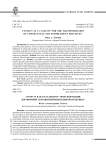
COVID-19 как катализатор трансформации договорной и правоприменительной практики
Статья научная
Введение: в статье представлен обзор влияния пандемии коронавируса (COVID-19) на договорную и правоприменительную практику. Рассмотрены наиболее распространенные способы заключения гражданско-правовых договоров, а также проблемы исполнения договорных условий, возникшие на фоне распространения коронавирусной инфекции. Проанализированы законодательные нововведения, обусловившие изменение порядка исполнения отдельных видов гражданско-правовых договоров, судебная практика, в которой правовая позиция сторон основывалась на аргументах о пандемии коронавируса. Методы: в настоящем исследовании были использованы как общенаучные (диалектический метод познания, анализ, синтез, формально-логический, прогностический методы и др.), так и частнонаучные методы (формально-юридический, метод юридического толкования и др.). Результаты: обосновано повышение востребованности цифровых технологий в условиях предпринятых государством мер по предотвращению распространения коронавирусной инфекции. Выявлены и рассмотрены новые тенденции договорной практики. Определены возможности правовой квалификации коронавируса в качестве непреодолимой силы, обстоятельства, обусловливающего невозможность исполнения обязательств, существенного изменения обстоятельств, в том числе с учетом имеющейся на момент написания работы судебной практики. Доказана целесообразность онлайн-урегулирования споров, возникающих в связи с неисполнением договорных обязательств. Выводы: по итогам проведенного исследования определена взаимозависимость между уровнем внедрения цифровых технологий в государственное управление, судебную систему, хозяйственную деятельность субъектов предпринимательской деятельности и возможностью адаптации к ведению текущей деятельности в данных сферах в условиях распространения коронавируса.
Бесплатно
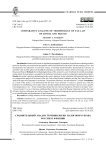
Comparative analysis of terminology of tax law of Russia and France
Статья научная
Introduction: Russian and French tax legislation presupposes the presence of special terms reflecting taxation processes, therefore, the article raises the question of the initial definition of all terms with the meaning of “tax” and characteristics that determine its economic essence. Everything mentioned above determined the relevance of scientific work and the authors set the aim of conducting a comparative analysis of the terminology of tax law in Russia and France. Methods: the methodological basis of this research is a set of methods of scientific knowledge, among which the main place is occupied bythe methods of consistency, analysis, comparative legal and descriptive. Results: the author’s position substantiated in the work is based on the tax legislation of Russia and France. Based on a comparative analysis of the norms of the Tax Code of the Russian Federation and the Tax Code of France, a studyof the types of tax payments is carried out. The question of the term “tax and collection” is raised. Conclusions: as a result of the study, it was determined that the term “taxes and fees” is used as a generic one, while the preference for establishing various types of taxes and fees applied in Russia and France is given to such a specific term designation as “tax”. It was revealed that, despite the use in the tax legislation of France in the name “taxe”, “la taxe foncière” is a tax. It has been established that in the Tax Code of the Russian Federation and the Tax Code of France, the terms of taxation are used as a means of formalizing the language for special purposes and contribute to the establishment and development of legal discourse.
Бесплатно
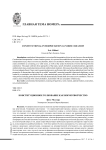
Constitutional interpretation as norm creation
Статья научная
Introduction: сonstitutional interpretation is not a scientific interpretation of a text or texts, known as the constitution. Constitutional interpretation is a norm-creation process; it is a process that establishes the constitution as a norm. Before interpretation occurs, there is no norm and, therefore, there is no constitution. Moreover, this means that interpreters can create constitution as a meaning, as a valid source, as well as they create the hiererchy of norms deriving from the constitution. This paper confronts three appraoches of that topic, namely formalistic (constitutionalism), apparently antiformalistic (neo-constitutionalism) and truly antiformalistic (realism). It discusses the political issue whether what is the most adequate theory if man wants to guarantee democracy and human rights and analyses judicial activism from this perspective. It demonstrates that, using the so-called “reasonable” reasoning grounded in democratic legitimacy, a court created by a constitution can decide not only what constitutional powers can achieve within the constitution, but also what powers (including powers that were formally democratically elected) shall do to enact a new constitution. That is to create a clause of eternity of the valid constitution, inconsistent with any conception of democracy.
Бесплатно
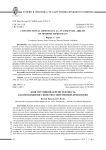
Constitutional resistance as an essential ability of modern democracy
Статья научная
Introduction: every organism has not only its own constitution, but also an attribute of resistance which protects it from external harmful impact. The same way every democratic State must have not only a formal Constitution and legitimate government, but it is not less important to be able to exercise constitutional resistance. There are many fields of constitutional matter which are studied sufficiently, such as status of constitutional legalism (constitutional legality) or separation of powers, but this paper’s aim is to disclose the other detached part of democratic mechanism, which can answer the question: why recently existed States with “constitutional legalism” and “separation of powers” were crashed. Theoretical basis of constitutional resistance is disclosed through the doctrines of rule of law and constitutional review and through the works of great founders of western constitutionalism such as Madison, de Tocqueville, Dicey, Sieyes, Sartori and others. The author’s original view is based on the practice of different high courts. Experience of constitutional crisis in the one States and successful constitutional resistance in the others demonstrates the practical value of this institution for democratic society. Results: such reflections give an opportunity to propose the formula of constitutional resistance. Allusions to the organic theory of the State bring to the relevant conclusion that constitutional resistance is the Health of the State.
Бесплатно
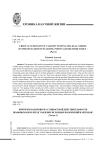
Статья научная
The purpose of this article is presentation of starting points and method tools for critical substantive validity testing of legal norms. The research problem in question is partly in what way the substantive validity of legal norms are determined, assessed and tested, partly the possible connection between the substantive validity of a norm and its efficiency in application in the legal practices in concrete cases. This is dealt with by presentation of starting points and method tools for critical substantive validity testing of legal norms. They are the result of independent, explorative research on my part. They have a general design. They are intended for use by a legal scholar within legal science. This is one way of performing a critical-practical-legal philosophy within legal science and by a legal scholar. They create the preconditions for and open the door for future research and provide the basis for deepened discussions in legal science.This article is divided into two parts.The purpose of the first part of this article is presentation of legal starting points for critical substantive validity testing of legal norms. The first part is titled “Critical substantive validity testing of legal norms. On presentation of starting points and method tools (I)”. The purpose of the second part of this article is presentation of legal scientific starting points and method tools for critical substantive validity testing of legal norms. The second part is titled “Critical substantive validity testing of legal norms. On presentation of starting points and method tools (II)”.
Бесплатно

Статья научная
The purpose of this article is presentation of starting points and method tools for critical substantive validity testing of legal norms. The research problem in question is partly in what way the substantive validity of legal norms are determined, assessed and tested, partly the possible connection between the substantive validity of a norm and its efficiency in application in the legal practices in concrete cases. This is dealt with by presentation of starting points and method tools for critical substantive validity testing of legal norms. They are the result of independent, explorative research on my part. They have a general design. They are intended for use by a legal scholar within legal science. This is one way of performing a critical-practical-legal philosophy within legal science and by a legal scholar. They create the preconditions for and open the door for future research and provide the basis for deepened discussions in legal science.This article is divided into two parts.The purpose of the first part of this article is presentation of legal starting points for critical substantive validity testing of legal norms. The first part is titled “Critical substantive validity testing of legal norms. On presentation of starting points and method tools (I)”. The purpose of the second part of this article is presentation of legal scientific starting points and method tools for critical substantive validity testing of legal norms. The second part is titled “Critical substantive validity testing of legal norms. On presentation of starting points and method tools (II)”.
Бесплатно
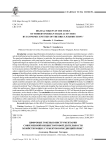
Статья научная
Introduction: computer algorithmization of production, transport, communication and other processes, which is activelydistributed across the countries of all the continents, has received a special name - digitalization of the economy. The speed and independence from distance, in particular, the interworking algorithms for attracting investments are perceived by entrepreneurs with great hope for success. According to the authors of the paper, by 2022 the financial digital technologies can replace up to 28 % of traditional banking and payment transactions, up to 22 % of insurance and foreign trade financing transactions. In the short term, the relevance of introducing the legal regulation of digital investment tokens will be dulyevaluated, so long-term foreign trade projects for long-term supplyof goods, in particular, bythe economic entities of the BRICS jurisdictions, will receive increasing financial support. In the scientific paper, the authors studied the activities of the Russian legislators on forming the legal regulation of the digital economy for the purpose of identifying their mistakes and shortcomings, as well as substantiating recommendations for the consolidation in the legislation of the viable legal structures which can be used bythe economic entities of the BRICS jurisdictions in long-term foreign trade transactions that require large financial resources for a period of 1 year or more. Relying entirely on thematerialistic worldviewand the general method ofhistorical materialism the authors used the general scientific and specific scientific (comparative law, normative-dogmatic, statistical, hermeneutic) methods for the study. As a result, the authors proved that the development of ICO investments would continue rapidly. The growing popularity of ICO will promote the technical “base” of the token market and strengthen the crypto protection ofsmart contracts and transactions within their performance. Tokens, as digital crypto records on the Internet resources, used bythe participants of foreign trade transactions of the BRICS jurisdictions - the organizers of investments, by 2022 will become the usual investment instruments, such as bonds or shares. The conclusions and recommendations on the correction of the Russian bills are formulated; the proposals for improving the infrastructure of remote investments in the Internet space of modern Russia are given. On the basis of a critical analysis of the scientific works of the economists and lawyers, the authors formulate the definitions of the studied tools of remote digital interaction of investors and organizers of investment of long-term foreign trade transactions, which can be carried out including the economic entities of the BRICS jurisdictions.
Бесплатно
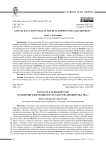
Govtech как новый этап в развитии электронного государства (правительства)
Статья научная
Введение: в последние годы отмечается стремительная смена парадигмы развития государственно-правовых отношений в связи с новыми технологическими решениями. На современном этапе исследователи оперируют термином «GovTech», давая оценку текущему социальному состоянию. Требуется научная характеристика категории «GovTech» (ГосТех) и выявления ее соотношения с категорией «электронное государство (правительство)». Цель: дать обзорную характеристику категории «GovTech» (ГосТех), определить степень соотношения с категорией «электронное государство (правительство)», выявить примеры внедрения GovTech в России. Методы: методологическую основу исследования составили общенаучные методы-анализ и синтез, а также частнонаучные - формально-юридический и сравнительно-правовой. Результаты: термин «GovTech» является достаточно новым для юридического научного дискурса и в данный момент отсутствуют определения, сформировавшиеся в рамках научной дискуссии. Однако контекст употребления этого термина относится к трансформации государственно-правовой реальности в первую очередь в контексте взаимодействия публичных органов управления и населения, увеличения удобства, открытости и повышения возможностей влиять на принятие решений. Выводы: категория «GovTech» (ГосТех) введена в научный оборот и используется в нормативных правовых актах. При этом вопрос о сущностном наполнении термина остается открытым. В силу приведенных примеров в Российской Федерации можно сделать заключение, что в данный момент GovTech является качественно новым этапом развития электронного государства (правительства).
Бесплатно
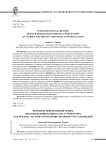
Статья научная
State policy in the sphere of tourism is one of the priority directions of development of the Russian economy, which implements the constitutional right of citizens to rest. However, due to have taken place in recent years, interruptions of business and subsequent announcements of its financial insolvency of a number of tour operators thousands of tourists have lost already paid vacation. With respect to the individual tour operators filed a bankruptcy case. The inadmissibility of violation of the rights and legitimate interests of the users of tourist services, taking into account the social character of the latter, is an important factor in the production of state of effective legal measures to prevent negative consequences of improper performance of obligations by persons engaged in entrepreneurial activity in the sphere of tourism. Intention of research - comprehensive analysis of the legal norms regulating organizations of bankruptcy prevention, and development of recommendations on improvement of legal regulation of relations developing on the prevention of the failure of the tourist organization-tour operator to meet the statutory financial requirements, in order to avoid subsequent recognition bankrupt. Methods basis of the thesis applied the general principles of scientific knowledge (comprehensiveness, consistency, objectivity, methodological pluralism), scientific methods of cognition (comparison ascent from the abstract to the concrete, etc.), general logical methods (analysis, synthesis, induction, deduction, generalization, classification, abstraction, etc.), specially-legal methods (formal and legal, comparative legal method of interpretation of the law, dogmatic, and others). Results: formed integrated legal regime of tour operator bankruptcy prevention, which includes the subjects, composition and consistency of risk monitoring loss of solvency tour operator, conditions and methods of prevention of bankruptcy the tour operator without the involvement and the involvement of third-party lenders, as well as the joining as a way to prevent bankruptcy of the tour operator under the agreement other Tourism Organization. Conclusions: fundamental importance is the correct definition of the moment, which means the start of measures to prevent the loss of solvency of the tour operator. This requires continuous monitoring of the financial condition of the tourism organization.
Бесплатно

